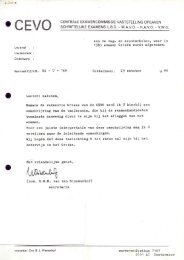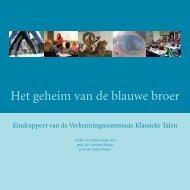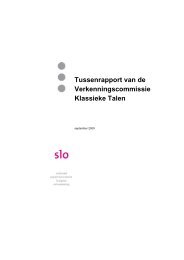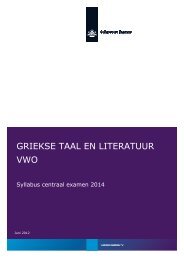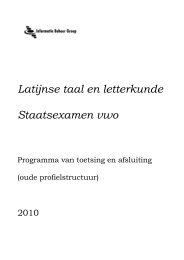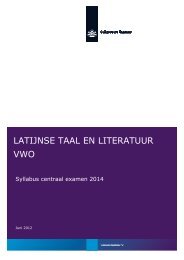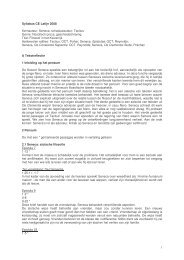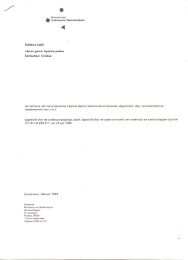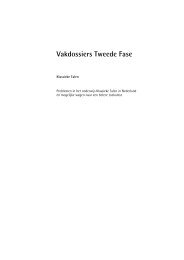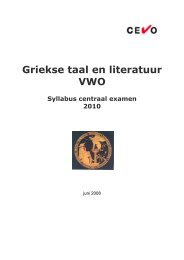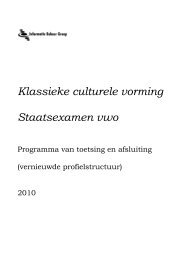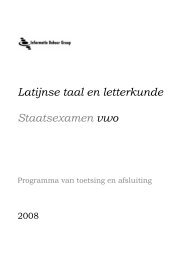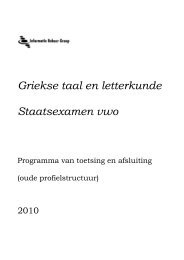Rome Wasn't Digitized in a Day - Council on Library and Information ...
Rome Wasn't Digitized in a Day - Council on Library and Information ...
Rome Wasn't Digitized in a Day - Council on Library and Information ...
You also want an ePaper? Increase the reach of your titles
YUMPU automatically turns print PDFs into web optimized ePapers that Google loves.
5<br />
elements of an apparatus criticus <strong>and</strong> <str<strong>on</strong>g>in</str<strong>on</strong>g>cludes <strong>on</strong>ly a s<str<strong>on</strong>g>in</str<strong>on</strong>g>gle editi<strong>on</strong> of each text. These<br />
limitati<strong>on</strong>s have led to serious criticism, particularly where there is dispute over the versi<strong>on</strong><br />
used by the TLG (Ruhleder 1995).<br />
Ruhleder also noted that while the corpus may have been broadened <str<strong>on</strong>g>in</str<strong>on</strong>g> <strong>on</strong>e sense, it is also far<br />
shallower as critical <str<strong>on</strong>g>in</str<strong>on</strong>g>formati<strong>on</strong> has been “decoupled” from the texts. Similar criticism of the TLG has<br />
also been offered more recently by Notis Toufexis:<br />
In the absence of detailed c<strong>on</strong>textualizati<strong>on</strong> <str<strong>on</strong>g>in</str<strong>on</strong>g>formati<strong>on</strong> accompany<str<strong>on</strong>g>in</str<strong>on</strong>g>g the <strong>on</strong>l<str<strong>on</strong>g>in</str<strong>on</strong>g>e versi<strong>on</strong> of<br />
each text, the user who wishes to check the reliability of a given editi<strong>on</strong> (if, for <str<strong>on</strong>g>in</str<strong>on</strong>g>stance, it uses<br />
all extant manuscripts of a text or not) has to refer to the pr<str<strong>on</strong>g>in</str<strong>on</strong>g>ted editi<strong>on</strong> or other h<strong>and</strong>books.<br />
The same applies to any attempt to put search results obta<str<strong>on</strong>g>in</str<strong>on</strong>g>ed by the TLG with<str<strong>on</strong>g>in</str<strong>on</strong>g> the wider<br />
c<strong>on</strong>text of a literary genre or a historical period. The TLG assumes <str<strong>on</strong>g>in</str<strong>on</strong>g> a sense that its users have<br />
a broad knowledge of Greek literature <strong>and</strong> language of all historical periods <strong>and</strong> are capable of<br />
c<strong>on</strong>textualiz<str<strong>on</strong>g>in</str<strong>on</strong>g>g each search result <strong>on</strong> their own (Toufexis 2010, 110).<br />
Criticisms such as these have been aimed at the TLG s<str<strong>on</strong>g>in</str<strong>on</strong>g>ce its found<str<strong>on</strong>g>in</str<strong>on</strong>g>g <str<strong>on</strong>g>in</str<strong>on</strong>g> the 1970s, <strong>and</strong> project<br />
founder Theodore Brunner has also acknowledged that access to the TLG does not exempt scholars<br />
from check<str<strong>on</strong>g>in</str<strong>on</strong>g>g pr<str<strong>on</strong>g>in</str<strong>on</strong>g>ted editi<strong>on</strong>s of classical texts for the apparatus criticus (Brunner 1987). Brunner<br />
cited both the desire to enter as many texts as possible <strong>and</strong> the relatively high costs of data entry (10<br />
cents a word <str<strong>on</strong>g>in</str<strong>on</strong>g> 1987) as reas<strong>on</strong>s for the approach the TLG chose to take.<br />
In additi<strong>on</strong> to the possible lack of c<strong>on</strong>textual or critical <str<strong>on</strong>g>in</str<strong>on</strong>g>formati<strong>on</strong>, many classicists whom Ruhleder<br />
<str<strong>on</strong>g>in</str<strong>on</strong>g>terviewed were c<strong>on</strong>cerned with the authority that was afforded to texts <str<strong>on</strong>g>in</str<strong>on</strong>g> the TLG, ow<str<strong>on</strong>g>in</str<strong>on</strong>g>g to their<br />
electr<strong>on</strong>ic nature. Ruhleder hypothesized that the TLG had affected the work of classicists <str<strong>on</strong>g>in</str<strong>on</strong>g> terms of<br />
(1) the beliefs <strong>and</strong> expectati<strong>on</strong>s they had of the materials with which they worked, (2) the nature of<br />
their skill sets <strong>and</strong> expertise, <strong>and</strong> (3) the <str<strong>on</strong>g>in</str<strong>on</strong>g>frastructure of their discipl<str<strong>on</strong>g>in</str<strong>on</strong>g>e. In terms of beliefs regard<str<strong>on</strong>g>in</str<strong>on</strong>g>g<br />
materials, classicists had previously assumed ga<str<strong>on</strong>g>in</str<strong>on</strong>g><str<strong>on</strong>g>in</str<strong>on</strong>g>g familiarity with a corpus was a life’s work <strong>and</strong><br />
happened <strong>on</strong>ly through c<strong>on</strong>stant read<str<strong>on</strong>g>in</str<strong>on</strong>g>g <strong>and</strong> reread<str<strong>on</strong>g>in</str<strong>on</strong>g>g of the text <strong>and</strong> that add<str<strong>on</strong>g>in</str<strong>on</strong>g>g to that corpus was a<br />
collaborative act.<br />
Ease of search<str<strong>on</strong>g>in</str<strong>on</strong>g>g <strong>and</strong> f<str<strong>on</strong>g>in</str<strong>on</strong>g>d<str<strong>on</strong>g>in</str<strong>on</strong>g>g texts <str<strong>on</strong>g>in</str<strong>on</strong>g> the TLG, Ruhleder proposed, left scholars free to pursue other<br />
work such as scholarly tool build<str<strong>on</strong>g>in</str<strong>on</strong>g>g or the creati<strong>on</strong> of electr<strong>on</strong>ic texts. But this process was not<br />
without its problems:<br />
Of course, tool build<str<strong>on</strong>g>in</str<strong>on</strong>g>g is a form of scholarly work <str<strong>on</strong>g>in</str<strong>on</strong>g> itself, <strong>and</strong> databanks <strong>and</strong> electr<strong>on</strong>ic texts<br />
are a form of “scholarly producti<strong>on</strong>.” However, this k<str<strong>on</strong>g>in</str<strong>on</strong>g>d of activity has traditi<strong>on</strong>ally ranked<br />
low; develop<str<strong>on</strong>g>in</str<strong>on</strong>g>g an <str<strong>on</strong>g>in</str<strong>on</strong>g>dex or a c<strong>on</strong>cordance ranks above develop<str<strong>on</strong>g>in</str<strong>on</strong>g>g teach<str<strong>on</strong>g>in</str<strong>on</strong>g>g materials, but<br />
below writ<str<strong>on</strong>g>in</str<strong>on</strong>g>g articles, books, commentaries <strong>and</strong> produc<str<strong>on</strong>g>in</str<strong>on</strong>g>g new textual editi<strong>on</strong>s. Develop<str<strong>on</strong>g>in</str<strong>on</strong>g>g<br />
computer-based tools is not even <strong>on</strong> the list (Ruhleder 1995).<br />
The challenge of evaluat<str<strong>on</strong>g>in</str<strong>on</strong>g>g scholarly work <str<strong>on</strong>g>in</str<strong>on</strong>g> digital classics, <strong>and</strong> <str<strong>on</strong>g>in</str<strong>on</strong>g>deed all of digital humanities, as<br />
well as the unwill<str<strong>on</strong>g>in</str<strong>on</strong>g>gness of many traditi<strong>on</strong>al tenure evaluati<strong>on</strong>s to c<strong>on</strong>sider digital scholarship, are<br />
themes that are seen throughout the literature.<br />
The sec<strong>on</strong>d major change identified by Ruhleder, that of shift<str<strong>on</strong>g>in</str<strong>on</strong>g>g skill sets <strong>and</strong> expertise, c<strong>on</strong>sidered<br />
how technical expertise was be<str<strong>on</strong>g>in</str<strong>on</strong>g>g substituted for experience ga<str<strong>on</strong>g>in</str<strong>on</strong>g>ed over time, <strong>and</strong> how classicists<br />
<str<strong>on</strong>g>in</str<strong>on</strong>g>creas<str<strong>on</strong>g>in</str<strong>on</strong>g>gly needed more-sophisticated technical knowledge to underst<strong>and</strong> the limitati<strong>on</strong>s of tools such<br />
as the TLG. The third major change, that of challenges to discipl<str<strong>on</strong>g>in</str<strong>on</strong>g>ary <str<strong>on</strong>g>in</str<strong>on</strong>g>frastructure, Ruhleder used to



